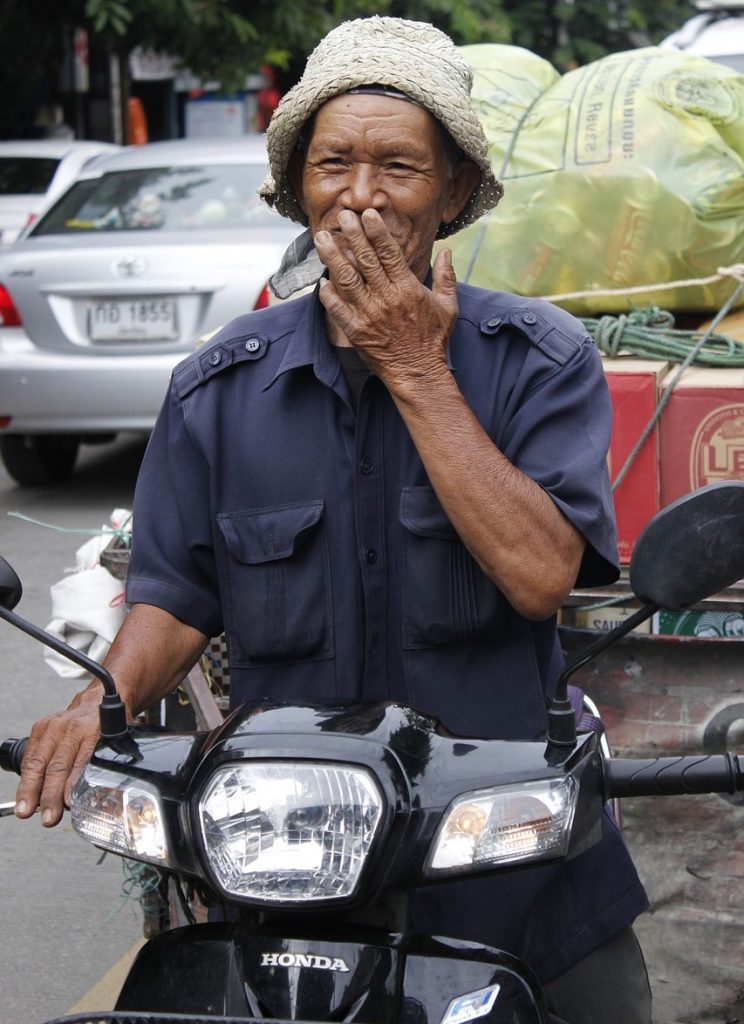8 quirks about Thai culture to know before visiting Thailand
Keen to fly to Thailand after Covid? Experience a slice of Thai culture from home – read about these eight foibles so as not to trip over them later.

If there’s one thing that can be said about Thai people, it’s that they’re a superstitious bunch.
Point at a rainbow with only one finger, and it will fall off. Leave home after hearing a gecko, and something bad will happen to you. Place a ton mai plant or tukkata clay doll on your desk, and you’ll make a mint.
While many of their customs and beliefs revolve around good and bad luck, there’s a lot more to this unique culture.
Let’s have a look at eight unique traditions that have stood the test of time.
1. Share food, eat on the floor and sit *on* the table
It’s perfectly normal for Thais to sit on the floor, the table or any flat object to eat at informal meet-ups.

Even so, considering their aversion to feet, it’s ironic that they eat their meals right where they walk. Besides, it isn’t outrageously comfortable to gobble in a cross-legged position or with your feet tucked away under your posterior, and let’s not talk about cleanliness.
On a lighter note, this doesn’t call for a formal setting, so nobody will pay attention to how you’re holding silverware. And while dazzling clothes may impress locals, don’t assume this is the time to wear a tie. Eating on the floor and sitting on the table is a laid-back approach to life and creates a sense of community – a strong element in Thai culture.
Talking about social gatherings brings us to another established practice.
2. Take off your shoes before entering a house, temple, shop and whatnot
This convention makes perfect sense. Whether you’re about to enter a temple, somebody’s home, some shop or even a restaurant, taking off your shoes is a sign of respect and keeps the dirt outside.

Unlike noshing on the floor that takes some getting used to, taking off your shoes becomes second nature to you quickly, even if you just visit for a couple of weeks.
If you’ve been to Thailand before, I have no doubt you’ve stumbled across the following sight.
3. Flout the traffic laws in a mai-pen-rai-fashion
Whether it’s driving against the traffic flow, not wearing a helmet or using the maximum capacity of a motorcycle, lots of Thai people apply rules differently here in the Land of Smiles.

The careless mai-pen-rai-it-doesn’t-matter-attitude prevails even in areas where personal safety is at stake. Spending some time in this Land of Silk and Money, you might get the impression that life is cheap.
While they’re apparently willing to take chances in terms of their own lives, showing respect to other people is deeply rooted in Thai culture and introduces the next tradition.
4. Wai instead of shaking hands
We’ve probably all seen the traditional Thai greeting – the slight bow with the palms pressed together in a prayer-like manner.

But did you know?
Thai people’s unmistakable wai is not just a greeting. It has four meanings:
- Sawasdee krap / kaa (hello, hi, good morning, good afternoon, good evening, goodbye)
- Kho Thoht (sorry)
- Showing respect
- Kop khun krap / kaa (thank you)
Don’t worry if you can’t do the wai properly. As a foreigner, you’re not always expected to wai back. It’s appropriate when you visit a Thai family or a monk, but wai-ing to receptionists or other hotel staff would be misplaced. You can’t go wrong if you wai to show respect or say sorry.
A thorny issue though is referring to a strawberry or animals when you address someone – there, you certainly *can* go wrong.
5. Call somebody animal names or strawberry
Legend has it that showing anger in Thailand is a big, fat no-no. Well, even Thais can get tremendously worked up and have no qualms about showing it.
All it takes is calling them strawberry or animal names. The worst of them all is the big, fat one you often see near Bangkok’s dirtiest canals. If you were to call somebody an ee-hia (monitor lizard), you’d stir up a hornet’s nest.

In which case, the otherwise promising jai yen yen (stay cool / keep calm) would be fruitless.
You’ll also not prompt a fruity laugh – although it’s nowhere near as bad as a monitor lizard and is used among friends in a jokey manner – if you address a woman by strawberry. The term suggests she’s been cheating or lying.
An ample girl is an elephant, and a disobedient person is referred to as a monkey.
Calling somebody a kwai (buffalo) will touch a nerve too, because the poor buffalos are considered dumb in Thai culture.
Do you happen to know wai? The thing with the strawberry and animals is confusing, until you get the hang of it.
Don’t worry though; Thai people are a kind-hearted and helpful lot.
6. Be accommodating and tolerant
More often than not, Thais are happy to lend a helping hand. Can’t find the place you want to go? Ask anybody. The worst you may have to pass is the language barrier.

Got straggly hair? They don’t care. Want to walk around in tie-dye clothes? Plenty of travelers do that in Koh Phangan, and nobody minds.
Well, Thais like elegant clothing too, but none of them will give you looks – provided you’re not about to enter a temple or some bureau.
Need to yawn in public? While yawning is considered mai soobhaab (impolite) in Thailand, locals are especially forgiving of infractions if farangs commit them.
In terms of tolerance and friendly vibes, the entire planet could take a page from their book. We’d better not adopt their superstitions, though.
7. Avoid telling parents how cute their baby is
Tell a Thai mom how cute her baby is, and she won’t like it. After all, a ghost might hear it and steal her little princess.

Other than not mentioning that their infant is sweet, unusual nicknames serve as protection from sinister spirits, such as “doll.”
Well, if dolls are around, evil spirits can’t be very far.
Joking aside, magical forces aren’t dim-witted enough to assume there isn’t a single child worth nicking, just because all babies have questionable nicknames.
Anyway. Let’s get back to the cheerful side of Thai culture.
8. Smile, yim, smile
Thai people smile for many reasons, besides the obvious one: to say sorry, control anger, mask feelings or butter somebody up. There’s every reason to grin from ear to ear, anytime and anywhere.

Reciprocating a smile even if you’re cross is perfectly reasonable, because it can make you a happier person.
While this well-known Thai etiquette isn’t difficult to understand, there are numerous cultural oddities you might not even know exist.
Either way, if you’d like to explore the Land of Smiles, explore what our trips are like, book a ticket and start packing your bags.
Know more of Thai people’s foibles? Leave a comment below and share!
FAQ
Not really, you are safe. If you’re eating a noodle soup, you may be given a pair, but otherwise, no.
No. Just when going inside homes, temples and smaller shops. If you aren’t sure, ask the shop or restaurant owner. Better safe than sorry.
Nothing will happen. You are a farang, a foreigner, so the Thais know you are just trying to be polite.






